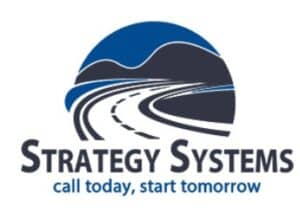In 2023, freight brokers moved over $150 billion of truckload freight supported by transportation management systems streamlining operations. Freight brokers are increasingly turning to Transportation Management System (TMS) software to streamline operations and boost efficiency.
This review outlines top-rated TMS technologies that can modernize your workflows to meet the emerging challenges of 2024. And when you finish reading, check out the other articles in our ‘TMS freight broker software’ series:
- Freight broker tools that will save you time
- Which freight broker tools give you real-time insights?
- How to choose the best TMS software for brokers
- Best TMS software for freight brokers
Quicklook: Best TMS freight broker software in 2024
- Best for integration with existing software: Rose Rocket TMS
- Best for large brokerage businesses: Trimble
- Best for LTL freight brokers: Transport Pro
- Best for customization: Strategy Live
4 best TMS systems for freight brokers
The best TMS software for carriers isn’t necessarily the best software for freight brokers. The following TMS transportation software solutions include features specifically designed to meet the unique needs of brokerage businesses like yours.
Rose Rocket TMS

Rose Rocket TMS is an open platform built specifically to integrate seamlessly with the other transportation technologies freight brokers rely on. Unlike other options, Rose Rocket provides an API-first, modular TMS designed for easy customization to each broker’s existing tech stack. This allows brokers to connect essential tools like load boards, accounting software, and custom brokerage applications into one cohesive ecosystem through Rose Rocket’s flexible architecture.
Best for: Integration with existing software
Special features
- API-first platform for easy integration
- Load board, carrier, 3PL ecosystem connectivity
- Custom workflow building
- Predictive auto-matching and smart load mixing
- Multimodal support (FCL, LTL, air, parcel)
- Visibility, tracking, alerts and EDI
Benefits
- Increased operational efficiency
- Enhanced shipment visibility
- Improved team communication/collaboration
- Time and cost savings
- Better margins from process automation
- Superior customer service
Disadvantages: Platform less ideal for carriers
Price: 14-day free trial period; reach out for a custom quote
Trimble

With its enterprise-grade TMS platform, Trimble allows large freight brokerages to manage complex, multimodal logistics operations around the globe. Through unified shipment visibility and customized workflows that adapt to each broker’s business, the platform offers the scalability to support significant growth in shipment volume. Trimble’s expertise serving major 3PLs and brokers enables them to build resilience and efficiency into brokerage networks managing millions in freight spend yearly.
Best for: Large brokerage businesses
Special features
- Global shipment visibility and tracking
- Configurable load optimization
- Predictive analytics and modeling
- Automated load tendering
- Multimodal transportation support
- Custom workflows and UI branding
- API integrations with other solutions
Benefits
- Increased operational efficiency
- Improved carrier management
- Enhanced supply chain resilience
- Data-driven decision making
- Unified view across logistics operations
- Ability to support aggressive growth
- Gain competitive advantages
Disadvantages
- Higher upfront costs
- Overkill for small brokers
Price: Custom quote based on users, workflows, modes
Transport Pro

Transport Pro streamlines complex less-than-truckload (LTL) freight management for brokers through specialized rating, transit times, and consolidation workflows. In addition to offering leaderboard tools ranking best performing LTL carriers, their automated Smart Route Guide aggregates transit options by lane. This saves brokers hours of manual research while enhancing customer service, ultimately boosting efficiency for LTL freight brokers.
Best for: LTL brokers
Special features
- Optimized LTL load rating and pricing
- Automated transit time calculation
- Shipment consolidation tools
- Carrier service quality leaderboards
- API connectivity to carriers
- Customizable shipment dashboards
Benefits
- Increased team productivity
- Faster LTL quote turnaround
- Improved customer experience
- Enhanced shipment visibility
- Better carrier relationship management
- Ability to support growth
Disadvantages
- Focused solely on LTL, not full truckload
- Limited accounting software integrations
- Steep learning curve for some users
- Support can be slow to respond
Price: Up to $399 per user monthly
Strategy Live

Strategy Live by Strategy Systems is a fully integrated TMS for freight brokers. This software supports custom reporting and requirements so brokers can better manage and strategize based on their specific needs. Strategy Live also has QuickBooks software integration for simplified accounting.
Best for: Customized broker software
Special features:
- Customizable management dashboards
- Customer relationship management
- Personalized solutions within one business day
Benefits:
- QuickBooks integration
- Dispatch software
- Billing and auditing features
- Live load tracking
Disadvantages:
- Not mobile friendly
- Lack of transparent pricing
Pricing: Variable pricing with a free demo
Do freight brokers need a TMS system?
Yes, most freight brokerages would benefit greatly from using TMS software for brokers. Here are some of the key reasons top TMS software can be valuable for freight brokers.
- Increased efficiency and automation: TMS software providers centralize data and workflows to optimize routing, dispatching, tracking loads, managing carrier communication, and more. This automation frees up significant time for brokers.
- Better carrier management: Carrier details like capabilities, restrictions, insurance, compliance docs and more can be tracked in a TMS for easier access and qualification. Improved visibility aids carrier relationship management.
- Enhanced shipment visibility: TMS freight brokerage software provides real-time tracking of load status through the entire transport lifecycle. Brokers can proactively update customers and quickly address any issues.
- Improved customer service: Customers benefit from the transparency, efficiency and informed support from broker usage of a robust transportation management system. This can lead to higher retention and more repeat business.
- Data analysis: The best freight broker software provides insights on operational bottlenecks, carrier performance trends, profitable customers/lanes, and other metrics to guide better decision making.
While some very small businesses still operate manually, adoption of freight broker TMS software is becoming an industry standard. The enhanced operational efficiency, carrier/customer management capabilities and data visibility make trucking TMS software invaluable for freight brokers looking to scale while controlling costs and service quality.
Benefit from the best TMS software for brokers
So, what is the best software for freight brokers looking for TMS software solutions? The answer depends on your specific requirements and business objectives, but you can’t go wrong with any of the TMS broker software options on this list. Just make sure you carefully weigh the features that are most important to you against various TMS software prices, and research reviews from actual customers. Transportation management software for freight brokers may ultimately be the best investment you can make in your business.
FAQ
Shippers and carriers, traditionally, use TMS software, but just about every freight broker has one as well. It helps to streamline operations and boost profitability.
A transportation management system (TMS) is a logistics technology platform that automates and streamlines key shipment management workflows. Within freight brokerages, TMS software centralizes dispatch, tracks shipments, boosts team collaboration, and provides insights to improve customer service.
Freight broker software costs vary widely based on the capabilities and scope of systems, but typically range from $60-$250 per user monthly up to customized enterprise platforms exceeding $150,000.


